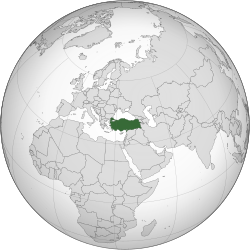Turkey
Republic of Turkey Türkiye Cumhuriyeti (Turkish) | |
|---|---|
 | |
 | |
| Capital | Ankara 39°N 35°E / 39°N 35°ECoordinates: 39°N 35°E / 39°N 35°E |
| Largest city | Istanbul 41°1′N 28°57′E / 41.017°N 28.950°E |
| Official languages | Turkish[1][2] |
| Spoken languages[3] | |
| Ethnic groups (2016)[4] | |
| Demonym(s) |
|
| Government | Unitary presidential constitutional republic |
| Recep Tayyip Erdoğan | |
| Fuat Oktay | |
| Mustafa Şentop | |
| Legislature | Grand National Assembly |
| Establishment | |
| 19 May 1919 | |
| 23 April 1920 | |
| 24 July 1923 | |
| 29 October 1923 | |
| 9 November 1982[5] | |
| Area | |
• Total | 783,356 km2 (302,455 sq mi) (36th) |
• Water (%) | 2.03 (as of 2015)[6] |
| Population | |
• 31 December 2020 estimate | |
• Density | 109[7]/km2 (282.3/sq mi) (107th) |
| GDP (PPP) | 2021 estimate |
• Total | |
• Per capita | |
| GDP (nominal) | 2021 estimate |
• Total | |
• Per capita | |
| Gini (2018) | medium · 56th |
| HDI (2019) | very high · 54th |
| Currency | Turkish lira (₺) (TRY) |
| Time zone | UTC+3 (TRT) |
| Date format | dd.mm.yyyy (CE) |
| Mains electricity | 230 V–50 Hz |
| Driving side | right |
| Calling code | +90 |
| ISO 3166 code | TR |
| Internet TLD | .tr |
Turkey (Turkish: Türkiye [ˈtyɾcije]), officially the Republic of Turkey,[a] is a country bridging Europe and Asia. It shares borders with Greece and Bulgaria to the northwest; the Black Sea to the north; Georgia to the northeast; Armenia, Azerbaijan, and Iran to the east; Iraq to the southeast; Syria and the Mediterranean Sea to the south; and the Aegean Sea to the west. Turks form the vast majority of the nation's population and Kurds are the largest minority.[4] Turkey's capital is Ankara while its largest city and financial centre is Istanbul.
One of the world's earliest permanently settled regions, present-day Turkey was home to important Neolithic sites like Göbekli Tepe, and was inhabited by ancient civilisations including the Hattians and Anatolian peoples.[11][12][13] Hellenization started in the area during the era of Alexander the Great and continued into the Byzantine era.[12][14] The Seljuk Turks began migrating in the 11th century, and the Sultanate of Rum ruled Anatolia until the Mongol invasion in 1243, when it disintegrated into small Turkish principalities.[15] Beginning in the late 13th century, the Ottomans started uniting the principalities and conquering the Balkans, and the Turkification of Anatolia increased during the Ottoman period. After Mehmed II conquered Constantinople in 1453, Ottoman expansion continued under Selim I. During the reign of Suleiman the Magnificent, the Ottoman Empire became a global power.[11][16][17] From the late 18th century onwards, the empire's power declined with a gradual loss of territories and wars.[18] In an effort to consolidate the weakening empire, Mahmud II started a period of modernisation in the early 19th century.[19] The Young Turk Revolution of 1908 brought limitations to the authority of the Ottoman Sultan, allocating power to the Ottoman Parliament, and ushered the empire into a multi-party period.[20][21] The 1913 coup d'état effectively put the country under the control of the Three Pashas, who were largely responsible for the Empire's entry into World War I in 1914. During World War I, the Ottoman government committed genocides against its Armenian, Assyrian and Pontic Greek subjects.[b][24] After the Ottomans and the other Central Powers lost the war, the Ottoman Empire was partitioned.[25] The Turkish War of Independence against the occupying Allied Powers resulted in the abolition of the Sultanate on 1 November 1922, the signing of the Treaty of Lausanne (which superseded the Treaty of Sèvres) on 24 July 1923 and the proclamation of the Republic on 29 October 1923. With the reforms initiated by the country's first president, Mustafa Kemal Atatürk, Turkey became a secular, unitary and parliamentary republic; which was later replaced by a presidential system with a referendum in 2017. Since then, the new Turkish governmental system under president Recep Tayyip Erdoğan and his party, the AKP, has often been described as Islamist and authoritarian.[26][27][28][29][30]
Turkey is a regional power and a newly industrialized country, with a geopolitically strategic location.[31] Its economy, which is classified among the emerging and growth-leading economies, is the twentieth-largest in the world by nominal GDP, and the eleventh-largest by PPP. It is a charter member of the United Nations, an early member of NATO, the IMF, and the World Bank, and a founding member of the OECD, OSCE, BSEC, OIC, and G20. After becoming one of the early members of the Council of Europe in 1950, Turkey became an associate member of the EEC in 1963, joined the EU Customs Union in 1995, and started accession negotiations with the European Union in 2005.
Etymology
The English name of Turkey (from Medieval Latin Turchia/Turquia[32]) means "land of the Turks". Middle English usage of Turkye is evidenced in an early work by Chaucer called The Book of the Duchess (c. 1369). The phrase land of Torke is used in the 15th-century Digby Mysteries. Later usages can be found in the Dunbar poems, the 16th century Manipulus Vocabulorum (Turkie) and Francis Bacon's Sylva Sylvarum (Turky). The modern spelling Turkey dates back to at least 1719.[33]
History
Prehistory of Anatolia and Eastern Thrace


